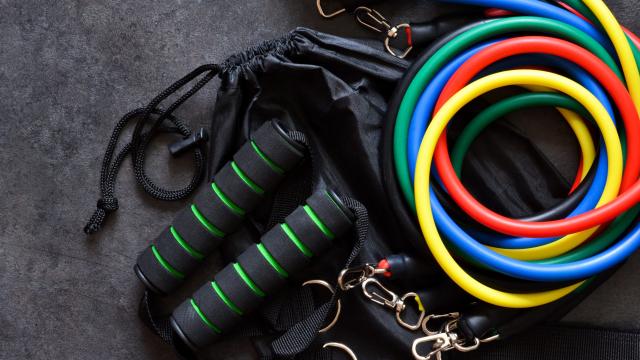Looking at beefing up your at-home workout gear? There’s a long list of exercise equipment out there, and it can be difficult to know which options are best for you. Today, we’re going to take a look at resistance bands and dumbbells, and chat about the pros and cons of both.
Let’s get into it, shall we?
Resistance bands can offer more total weight
If you buy beefy enough resistance bands, they offer a lot of resistance. A pair of “strong” bands from EliteFTS will pull on a barbell with the same force as 55 to 125 kg of weights, depending on how far you stretch them. Way back at the beginning of quarantine, coach Greg Nuckols told us that a set of bands would be his pick for training as heavy as possible at home.
Dumbbells are more versatile
If you truly love resistance bands, you can probably figure out how to do almost anything with them. But for most of us, dumbbells are a little more intuitive and it’s easier to find exercises that work appropriate muscles.
If you use a resistance band, for many exercises you’ll need to find a place to anchor it. Sometimes you step on the band, so it’s pulling on your feet (not always comfortable if you work out barefoot). Other times you’ll need an appropriate anchor at floor level, or overhead, or straight in front of you. Depending on where you work out, there may not be anything strong enough to do the job with the right placement.
Bands wear out over time
Iron is forever, but rubber degrades over time. Check the manufacturer’s directions, but most will tell you to replace your bands after a year, or sometimes just a few months.
The way you use the bands can affect their lifespan. If the band rubs against its anchor point, for example, that can wear it out more quickly. (Follow manufacturers’ instructions for properly anchoring the band or attaching it to accessories.)
When a band snaps, it may end up hitting you, which is why some trainers advise against moves like face pulls in which you’re pulling a band toward yourself.
The tension on bands depends on their length
This, I think, is the most important difference between bands and dumbbells. If you pick up something from the floor — you’re deadlifting a barbell or a pair of dumbbells, for example — you have to support its entire weight as soon as it leave the ground. But if you’re getting the resistance from a band, the resistance will feel very light when you’re closer to the floor, and get progressively harder as you stand up with it.
This means you may be working harder than you want at the top of the lift, but not being challenged at all at the bottom. You can still work all your muscles if you choose and combine exercises appropriately, but this factor means that bands aren’t a drop-in replacement for dumbbell or barbell work.
You’ll outgrow fixed dumbbells
People often start with a pair of dumbbells that come stamped with a number on one end (a five-pound pair, for example), but if you actually train with them consistently, pretty soon you’ll need more. You’ll also notice that different exercises require different weights: Something that’s challenging to curl will probably still be too light to press overhead.
A way around this is to buy adjustable dumbbells. You slide plates on and off, or with the fancy (expensive) brands you place them back on their rack and select the next weight.
You can still outgrow adjustable dumbbells. The affordable ones that come in 18 kg sets might seem huge to you at first, but 9 kg per hand is not that much if you’re strong. “I can always buy more of the little plates,” you’ll say to yourself, forgetting to check how much room the dumbbell handle has for little plates. Often, not much.
The bottom line is that dumbbells and resistance bands each have their pros and cons. It’s cheaper to buy several sizes of resistance bands than to buy a full lineup of dumbbells, but the bands won’t necessarily give you the same workout. This is another case where the ideal answer is probably: Why not both?
This article has been updated since its original publish date.

Leave a Reply
You must be logged in to post a comment.